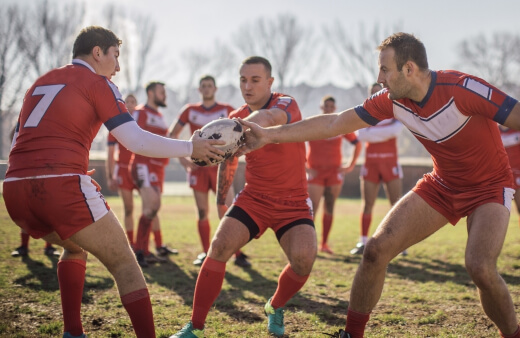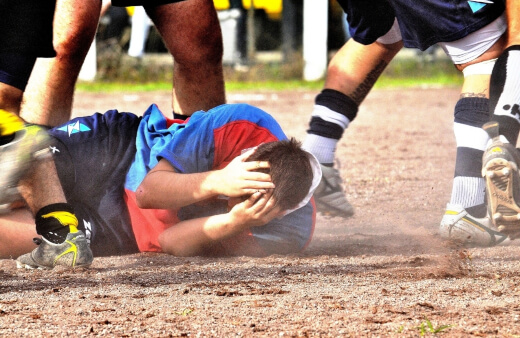Rugby union has a high risk of injury since it is a physical contact sport. There are several common rugby union injuries that are more common than others. If you or your child is injured playing rugby union, have them treated as soon as possible.
Prevention and Treatment of Common Rugby Union Injuries

1. Dislocated Shoulder
What is it?
Dislocated shoulders can happen when a player falls or is tackled. In most instances, the shoulder can be put back into place by a medical expert. Even if the shoulder can be popped back in, the area should be x-rayed to make sure there are no fractures or other injuries.
Prevention
Since rugby union is a physical sport, it is impossible to prevent all shoulder injuries. Players that have strong shoulder muscles are less likely to experience a dislocated shoulder.
Dislocated Shoulder Treatment
If there are no additional injuries, pain will alleviate once the shoulder is back in place. If you require surgery, you will have to wear a sling for a few weeks. After the sling is removed, your doctor will prescribe strengthening and rehabilitation.
You may need to take pain relievers and/or muscle relaxants during the healing process. Physiotherapy is often recommended for a player that has had a dislocated shoulder. The therapy will strengthen the shoulder, add stability, improve range of motion, and help prevent re-injury.
2. Sprained Ankle
What is it?
A sprained ankle can occur when the ligaments are overstretched and torn. The severity of the injury can vary. A sprained ankle is one of the most injuries in rugby union.
Prevention
The best way to prevent an ankle sprain is with proprioceptive training and strength training. With balance training and strong muscles, you will be less likely to experience a sprain. Ankle taping is also recommended to add additional support.
Sprained Ankle Treatment
If you have sprained your ankle, you should go to your doctor. They will usually x-ray your ankle to make sure there are not any fractures. If the injury is serious, you may need to have surgery.
In other cases, you can use rest, ice, compression, and elevation to relieve the swelling, pain and discomfort. Your doctor may want you to work with a physiotherapist. Therapy will help you restore motion, improve strength, decrease pain and swelling, and improve your balance.
3. Knee Strain
What is it?
Knee injuries are quite common in rugby union. The ligaments in the knee can be damaged due to overuse or a collision with the knee.
Prevention
Having strong leg muscles can help prevent knee strain. The muscles provide the knees extra support. It is important that your exercise regimen includes leg workouts.
Knee Strain Treatment
In severe cases, the knee may need surgery. In most cases, your doctor will tell you to stay off your feet and keep your leg elevated. You can use ice and anti-inflammatory medication to help with the pain.
Your doctor may also recommend physiotherapy. Therapy will help the ligaments heal, strengthen your leg muscles, and prevent future injuries.

4. Neck Sprain
What is it?
A neck sprain can occur when a muscle or ligament in the neck is stretched beyond its normal range. Once it is stretched, it snaps back insistently.
Prevention
Neck exercises will stretch and strengthen the muscles. Our Physiologists will work with you and teach you the best ways to strengthen your neck.
Neck Sprain Treatment
A neck sprain is often treated with over the counter pain relievers and doctor prescribed muscle relaxants. During the first few days, you can use ice for 15 to 30 minutes at a time to reduce inflammation.
You should not use heat during the first few days. Other treatments can include massages, exercise physiology and ultrasound therapy.
5. Concussions in Rugby Union
What is it?
A concussion is an injury that is caused by a blow to the head. It is rarely life-threatening, but it can be dangerous. Concussions are the most serious of the common rugby union injuries.
It is an injury that can have serious consequences throughout your life. There are still studies happening to determine the severity of concussions.
Prevention
The best way for a rugby union player to prevent a concussion is by following the rules of the games. These rules are put into place to keep the players safe.
Concussion Treatment
If your doctor believes you have suffered a concussion, they will perform a neurological examination and cognitive testing. For those who are experiencing severe symptoms, imaging tests may also be performed.
Concussions are usually treated with physical and mental rest. It is important to limit all activities that require mental concentration and keep an eye out for triggers that make your symptoms worse.
Visit SSEP for Treatment and Prevention of Common Rugby Union Injuries
If you play rugby union, you know how easy it can be to get injured playing the sport. Some of the most common rugby union injuries can be prevented with strength training and conditioning.
At Sydney Sports and Exercise Physiology, our exercise physiologists will provide you with a personalised program based on your assessment. You can talk with us to get a professional opinion on what we believe you need to do.
With our help, you can prevent future injuries and treat the most common rugby union injuries.
